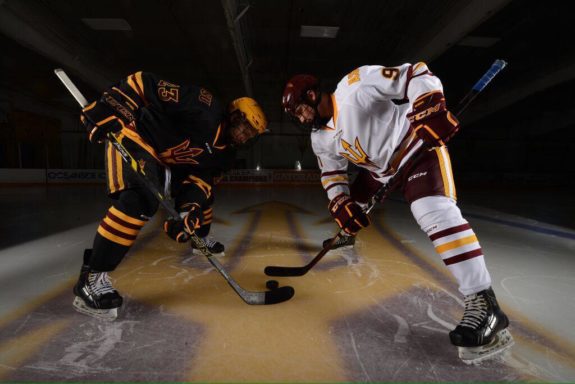The war between the Arizona Coyotes and the city of Glendale appears to have reached a conclusion.
After nearly a decade of venom, venom and more venom, the Coyotes apparently decided to take their toys, abandon the sandbox and sulk no more. Tired of rejection and denunciation from Glendale city officials, the municipality in which their home rink is located, the Coyotes began to explore locations, within the greater Phoenix metro area, in which to call a permanent home.
Not that the Gila River Arena is far from a first-class facility, which it is not, but protracted conflicts, broken agreements and a lingering animosity have interacted to force the Coyotes’ hand. When the city of Glendale decided to break a 15-year agreement in July, 2015, the Coyotes initiated court proceedings. The subsequent ruling said Glendale was obligated to pay the Coyotes $8.5 million for each of the next two years to essentially manage the arena.
The first year of this agreement ends this coming summer, and the Coyotes have another year of obligation. By that time, a new arena, possibility in cooperation with Arizona State University, could near competition and the Coyotes would be free to vacate the 17,235 seat facility which they now call home.

While the Coyotes losses reported to reach $50 million a year over the past few years, the city of Glendale felt a residual effect. The city began to lose $10 million a year in obligations, and sought a way to end this financial drain. When city officials felt they discovered a conflict of interest involving two former city employees and their subsequent association with the Coyotes, they decided to break an existing 15-year agreement with the hockey team.
At that point, the Coyotes threatened with legal action, and that’s when the parties settled on the current two-year obligation from the city.
When the arena opened on Dec. 26, 2003, the final cost was $220 million. If the Coyotes decide to walk within the foreseeable future, the mortgage and financial obligation, without a major tenant, could be frightful for taxpayers.
Yet, that’s an issue the city will have to deal with residents.
For now, the Coyotes are seeking to get out of an ugly relationship with what the owners and fans consider as bitter and adversarial.
“I think it’s important for the franchise that they had long-term stability in Glendale, and Glendale chose to move in another direction,” NHL commissioner Gary Bettman told ESPN.com during last weekend’s All-Star events in Nashville. “Since they seem to have a lot of terrific options in the 11th-largest market in the United States, they’re very optimistic.”
Sharing With Arizona State
A partnership with Arizona State University began this season, and the NHL team and the college would both benefit from sharing a facility. The Coyotes’ current home of Gila River Arena is located on the west side of the Phoenix metro area and a considerable distance from the bulk of their fans. Many travel across commuter-clogged freeways to attend games, and it’s not unusual for commutes to last one hour or more and compete with rush hour traffic for weekday games.
One possible plan calls for the Coyotes and Arizona State to share an arena near campus in Tempe, and that would make access from communities like Scottsdale, Gilbert, Chandler, Fountain Hills and other municipalities on the east side in much closer proximity to regularly attend Coyotes games and events.
Earlier this season, Arizona State, now a Division I program, hosted a tournament at Gila River Arena and included Yale, Michigan Tech and UConn. In late February, the Sun Devils return to the arena and host the United States under-18 team on Feb. 27. Both Coyotes’ president Anthony LeBlanc and Ray Anderson, the Sun Devils athletic director, expressed a desire to deepen the relationship and for the Devils to play more games in the current NHL building.
Down the road, that could very well happen. Just a few months ago, a discussion surfaced that the Coyotes and the NBA Phoenix Suns might share a new, downtown arena. In recent weeks, that conversation cooled, and that’s when the Coyotes began to quietly work behind the scenes to rid themselves of the Glendale mess and start life anew.